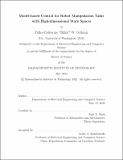Model-based Control for Robot Manipulation Tasks with High-dimensional State Spaces
Author(s)
Githinji, Bilha-Catherine "Bilkit" W.
DownloadThesis PDF (6.170Mb)
Advisor
Shah, Julie A.
Terms of use
Metadata
Show full item recordAbstract
Long horizon manipulation tasks are typically composed of sub-tasks with varying complexity. One phase of the task, for example, may require a continuous action space and another may be more efficiently solved using a discrete action space. Similarly, complexity in the state space may require analogous abstractions in order to apply classical planning and control methods; e.g., viewing a symbolic representation versus pixel-based representation. A common approach to addressing long horizon tasks is to develop a hierarchical system with a fixed state representation and a set of discrete and continuous action spaces to solve components of the task. However, tasks with high-dimensional state spaces present a problem for this approach where the fixed representation is ill-fit for solving certain phases of the task. This work motivates an alternative where learnt abstractions of the state space allow a hierarchical system to do coarse-to-fine reasoning of representation information to solve a task more effectively. We demonstrate a prototype of such an adaptive system and compare its performance with a system that has fixed representations. The prototype was tested in simulated table-top experiments as well as physical experiments with the Franka Emika Panda arm. The prototype outperformed the baselines in all long horizon cloth manipulation tasks by a margin of up to 20% and matched baseline performance in the rope domain.
Date issued
2022-05Department
Massachusetts Institute of Technology. Department of Electrical Engineering and Computer SciencePublisher
Massachusetts Institute of Technology